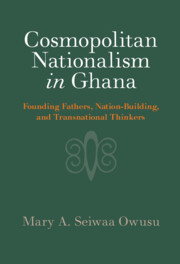Book contents
- Cosmopolitan Nationalism in Ghana
- Cosmopolitan Nationalism in Ghana
- Copyright page
- Dedication
- Contents
- Figures
- Tables
- Acknowledgements
- Abbreviations
- Maps
- Introduction
- 1 Ghana’s Grand Narrative
- 2 Rethinking Proto-Nationalism
- 3 Rethinking Cultural Nationalism as Debates on Synthesis (1887–1920)
- 4 Misreading Conservative Nationalism (1920–1945)
- 5 Rethinking the Monopoly of Radical Nationalism (1946–1958)
- Conclusion
- Bibliography
- Index
5 - Rethinking the Monopoly of Radical Nationalism (1946–1958)
Published online by Cambridge University Press: 12 December 2024
- Cosmopolitan Nationalism in Ghana
- Cosmopolitan Nationalism in Ghana
- Copyright page
- Dedication
- Contents
- Figures
- Tables
- Acknowledgements
- Abbreviations
- Maps
- Introduction
- 1 Ghana’s Grand Narrative
- 2 Rethinking Proto-Nationalism
- 3 Rethinking Cultural Nationalism as Debates on Synthesis (1887–1920)
- 4 Misreading Conservative Nationalism (1920–1945)
- 5 Rethinking the Monopoly of Radical Nationalism (1946–1958)
- Conclusion
- Bibliography
- Index
Summary
This chapter examines the post-WWII era where the idea of exclusive Convention Peoples Party (CPP) radicalism and Pan-Africanism rests most thickly. It argues that debates about the CPP’s Citizenship Act complexifies its pan-African credentials. Also, the CPP’s political philosophy was not radical and distinct compared to its opponents, as it fits within a broad liberal/ cosmopolitan tradition rooted in Europe and America. So-called conservatives were oftentimes more radical, as shown in parliamentary debates on the “Motion of Destiny.” Contentious discussions about whether to achieve self-government by proclamation or negotiation, are obscured by the dyad of radical versus conservative. Debates about federalism, regionalism, and unitary government remain unexplored because the grand narrative rebukes the opponents of Kwame Nkrumah’s socialist agenda, while granting him hero status. Nkrumah’s prolific writing and the squeezing out of his opponents after he became Prime Minister in 1957 are identified as the architects of Ghana’s grand narrative.
Keywords
- Type
- Chapter
- Information
- Cosmopolitan Nationalism in GhanaFounding Fathers, Nation-Building, and Transnational Thinkers, pp. 202 - 251Publisher: Cambridge University PressPrint publication year: 2024

